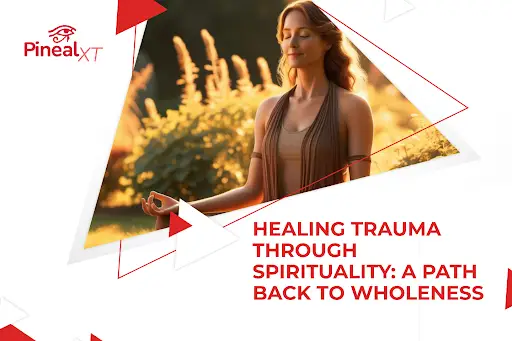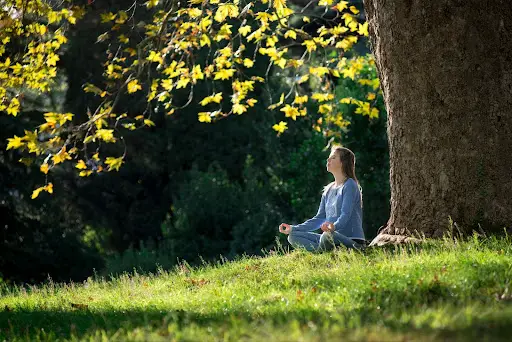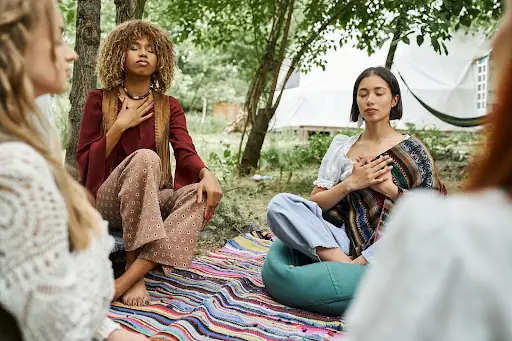Healing Trauma Through Spirituality: A Path Back to Wholeness

Hey there,
Let’s talk about something that affects so many of us, yet doesn’t always get the space it deserves:
Trauma.
Sometimes, it comes from a single life-changing event or the slow erosion caused by repeated emotional wounds…
Either way, trauma leaves its mark.
Not just on our minds but on our bodies, our spirits, and yes, even our pineal glands.
But here’s the good news: healing is possible.
And spirituality…
Usually brushed aside as soft or secondary…
Has become one of the most powerful tools in helping people recover from deep emotional and psychological wounds.
Today, we’re diving into how spiritual practices are being integrated into trauma therapy, why they work…
And what the pineal gland has to do with it.
Whether you’ve experienced trauma yourself or you’re supporting someone who has…
I hope this newsletter offers some insight, hope, and practical tools.
Let’s get into it.
What Is Trauma, Really?

When people hear the word “trauma,” they think of extreme events:
War, abuse, or catastrophic accidents.
And while those absolutely qualify, trauma can also stem from:
- Emotional neglect in childhood
- Loss of a loved one
- Repeated exposure to stress or instability
- Bullying, discrimination, or exclusion
At its core, trauma isn’t just what happens to us…
It’s how our nervous system processes and holds onto those experiences.
It’s why two people can go through the same event…
But one carries lasting wounds while the other doesn’t.
Trauma often gets stored in the body…
Locked away in tight shoulders, shallow breathing, and an overactive fight-or-flight response.
And guess what?
It also impacts the pineal gland, disrupting the natural rhythms of sleep, emotional balance…And even our connection to higher consciousness.
Why Spiritual Practices Are So Effective for Healing Trauma
Traditional therapy methods like CBT (Cognitive Behavioral Therapy) and EMDR (Eye Movement Desensitization and Reprocessing)…
Have been game-changers in trauma recovery.
But more and more therapists are integrating spiritual practices into their work…
And for good reason.
1. Spirituality Restores a Sense of Meaning

One of the hardest parts of trauma is the loss of meaning…
It can feel like the world is chaotic, cruel, and senseless.
Spirituality offers a counterbalance to this by providing a sense of purpose and connection to something larger than ourselves.
Whether it’s through prayer, meditation, or simply feeling connected to nature…
Spirituality reminds us that we are not alone and that our suffering isn’t meaningless.
2. Spiritual Practices Calm the Nervous System
Meditation, breathwork, and mindfulness are spiritual tools that have been scientifically proven to reduce cortisol (the stress hormone)…
And activate the parasympathetic nervous system.
This is critical for trauma survivors because their nervous systems get stuck in a chronic fight-or-flight mode.
Spiritual practices give the body and mind a chance to exhale, rest, and repair.
3. Community and Belonging

Isolation is a hallmark of trauma.
It makes people feel cut off from others, even when they’re surrounded by people who care about them.
Spiritual communities, like a meditation group, a yoga class, or a faith-based gathering…
Offer a safe space to connect and be seen without judgment.
Sometimes, just knowing you’re not alone is the first step toward healing.
4. Accessing the Subconscious Mind
Spiritual practices like visualization, guided meditation, and mantra chanting…
Have a unique ability to bypass the conscious mind and speak directly to the subconscious…
The place where many traumatic memories are stored.
It’s like gently unlocking a door that’s been sealed shut for years and letting fresh air in.
The Pineal Gland: Your Spiritual Gateway to Healing
Now, let’s bring in our friend, the pineal gland.
If you’ve been with me for a while, you know how passionate I am about this tiny, pinecone-shaped gland in the brain.
The pineal gland regulates melatonin, which controls our sleep-wake cycles and influences mood.
But it’s also the “seat of the soul”…
A bridge between the physical world and higher states of consciousness.
How Trauma Impacts the Pineal Gland:

- Chronic stress and trauma can disrupt melatonin production, leading to insomnia, fatigue, and mood swings.
- Emotional pain can create an internal “fog,” blocking the intuitive clarity associated with the third eye.
- The sense of disconnection felt by trauma survivors can weaken the pineal gland’s ability to tune into higher states of awareness.
How Spiritual Practices Restore Pineal Health:

- Meditation: Reduces cortisol, enhances melatonin production, and brings clarity to the mind.
- Breathwork: Increases oxygen flow, supports emotional release, and stimulates the pineal gland.
- Visualization Exercises: Activate the third eye and help release emotional blockages stored in the subconscious.
- Sunlight Exposure: Natural sunlight supports melatonin production and resets the pineal gland’s natural rhythms.
When the pineal gland is functioning well, it’s like turning on a light in a dark room.
Suddenly, healing feels more accessible, and hope feels more real.
Practical Steps for Using Spirituality to Heal Trauma
Here are some simple but powerful practices to explore:
1. Daily Meditation
- Start with just 5-10 minutes each day.
- Focus on your breath or repeat a calming mantra.
- Visualize light pouring into your third eye, clearing away emotional debris.
2. Gratitude Journaling
- Write down three things you’re grateful for every day.
- Reflect on small moments of peace or beauty.
3. Spend Time in Nature
- Nature has a way of resetting our nervous systems and calming our minds.
- Take a walk, sit under a tree, or listen to the sounds of water.
4. Join a Supportive Spiritual Community
- A meditation group, a yoga class, or an online circle…
Find a community where you feel safe and supported.
Healing Is a Spiritual Journey

Healing trauma is not a way to “fix” what’s broken.
It’s a way to reclaim your wholeness.
It’s about reconnecting with your body, your emotions, your spirit, and, yes, your pineal gland.
Spirituality doesn’t replace traditional therapy, but it can be a deeply meaningful companion on the journey.
When we combine the wisdom of ancient practices with modern science, incredible things become possible.
Your Turn: What Has Helped You Heal?
Have spiritual practices played a role in your healing journey?
Are there tools or rituals that have made a difference for you?
Hit reply and share your story! I’d love to hear from you.
I always try to remind people that healing isn’t linear, and it’s not a race.
Every breath, every moment of stillness, and every small act of self-compassion brings you closer to peace.
See you next time,
Eric Thompson

